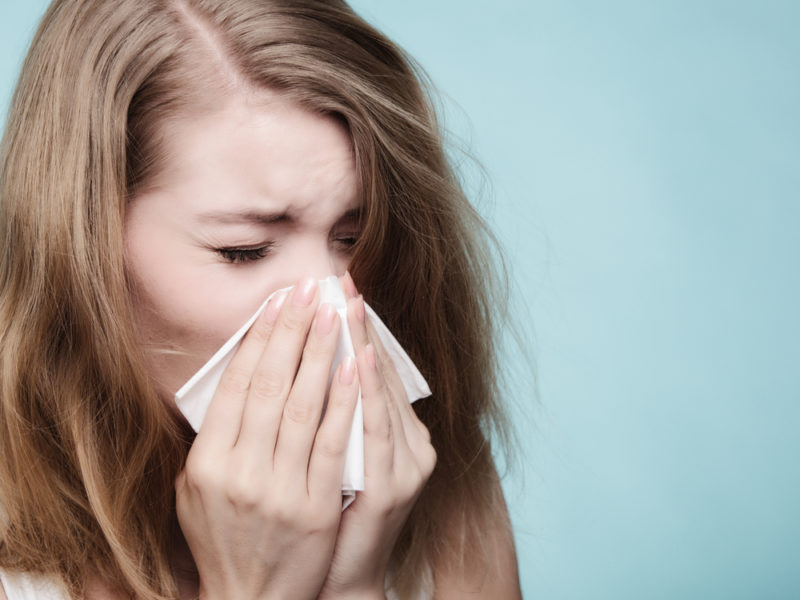
Rhinitis is an inflammation of the lining of the nose. Causes of rhinitis are divided into two, namely allergic and non-allergic (vasomotor rhinitis). If allergens are the cause of allergic rhinitis, then what causes vasomotor rhinitis? Here’s the full explanation.
Various causes of vasomotor rhinitis
Vasomotor rhinitis or non-allergic rhinitis is inflammation of the mucous membranes of the nose.
A mucous membrane is a membrane in the nose responsible for producing mucus or mucus.
Inflammation of the nose lining can occur when the blood vessels in the nose widen, causing swelling.
Dilation of the vessels in the nose also produces blood or fluid in the nose so that nose becomes congested. This condition can cause chronic sneezing, nasal congestion, and runny nose for no reason.
Although it causes symptoms that make you uncomfortable, this condition is generally not dangerous.
This rhinitis often occurs in adults after the age of 20 years. Women have twice the risk as men.
Here are the causes of vasomotor rhinitis that often make you uncomfortable.
1. Irritation from the environment
An unsanitary environment can trigger irritation so that a person can experience non-allergic rhinitis.
The environment is the most common trigger of non-allergic rhinitis, Quoting to the Mayo Clinic.
Environmental conditions that can trigger vasomotor rhinitis include:
- dusty room,
- a lot of cigarette smoke,
- pungent odour (perfume),
- combustion smoke.
In some cases, you may find the condition at home and work.
2. Use of drugs
Because vasomotor rhinitis occurs without allergies, you can experience it even if you don’t have a drug allergy.
Still from the Mayo Clinic, certain medications can cause vasomotor rhinitis, such as:
- nonsteroidal anti-inflammatory drugs (aspirin and ibuprofen)
- family planning pills,
- hypertension drugs (Propanol, Metoprolol, Atenolol),
- decongestant nasal spray,
- medications for erectile dysfunction,
- antidepressants, and
- some sedatives.
Excessive decongestant nasal sprays can cause non-allergic rhinitis, namely rhinitis medicamentosa.
3. Food and drink
Consumption of food and drink can also cause non-allergic rhinitis (vasomotor rhinitis).
Generally, this inflammation can occur when you eat spicy and hot foods and alcoholic beverages.
Both conditions can cause the lining of the nose to swell and then generate a stuffy nose.
4. Weather changes
Changes in temperature and humidity conditions can trigger swelling in the lining of the nose, then runny and stuffy nose.
Sudden changes in temperature or humidity can also trigger non-allergic rhinitides, such as the rainy season and viral infections (flu and colds).
This viral infection can cause a runny, stuffy nose and sneezing.
5. Hormonal changes
Vasomotor rhinitis can also occur due to hormonal imbalances in the body, such as:
- puberty,
- menstruation,
- pregnancy,
- use of oral contraceptives (birth control pills), and
- hypothyroidism.
For causes of vasomotor rhinitis, pregnancy usually begins in the second month of pregnancy and lasts until delivery.
Symptoms of non-allergic rhinitis may disappear and appear throughout the year and last only a few weeks.
Standard features of non-allergic rhinitis that may occur are:
blocked nose,
runny nose,
sneeze,
the presence of phlegm in the throat, and
cough.
Symptoms may be similar to allergic rhinitis.
However, vasomotor or non-allergic rhinitis does not cause an itchy nose, eyes, and throat. Vasomotor rhinitis tends to occur for no apparent reason and can occur at any time. Meanwhile, allergic rhinitis is more often a seasonal problem.
In general, the cause of vasomotor rhinitis is not life-threatening. When you feel this, you will feel so uncomfortable that it interferes with your activities.
how to prevent vasomotor rhinitis?

You can prevent non-allergic rhinitis by knowing the causes and triggers. Avoid things that can cause vasomotor rhinitis.
For example, you can reduce the excessive use of nasal decongestants to prevent non-allergic rhinitis.
Although these drugs can provide short-term treatment for rhinitis symptoms, taking them for more than three or four days can worsen symptoms.
Some people experience long-lasting or long-term vasomotor rhinitis by Quoting from the Cleveland Clinic. However, vasomotor rhinitis with a viral cause usually resolves more quickly.
If your symptoms get worse, contact your doctor immediately. The doctor will diagnose any health problems that may make the condition worse.



